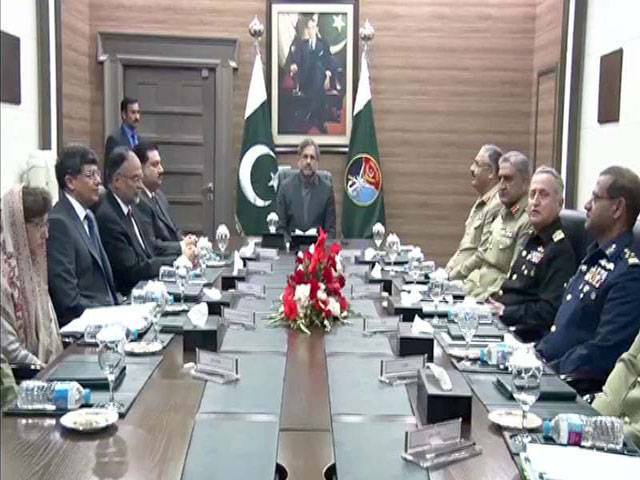RAWALPINDI - Expressing concern over arms build-up by India that threatens regional stability, Pakistan yesterday showed full confidence in the capability of country’s defence forces to meet any security challenge.
The National Command Authority (NCA) Thursday took stock of the security environment in South Asia. Chaired by Prime Minister Shahid Khaqan Abbasi and attended by highest civil and military officials, the meeting received a briefing on the current geostrategic environment.
The highest national security forum reiterated country’s policy of developing and maintaining full spectrum deterrence, in line with the policy of credible minimum deterrence and avoidance of arms race.
The NCA congratulated the scientists and engineers on their contributions to strengthen national defence capabilities. It appreciated the technological sophistication demonstrated during the tests of Babur III SLCM and Ababeel Missile System, which have ushered in a new era in technological sophistication of Pakistan’s strategic capabilities.
It also appreciated the high standards of training and operational readiness of the strategic forces to meet all kinds of threats.
The security body however noted with concern certain destabilising actions being taken in Pakistan’s neighbourhood, which undermine the objective of maintaining strategic stability in South Asia.
Without naming India, it condemned these negative steps that include the massive arms build-up in the conventional domain, nuclearisation of the Indian Ocean Region and plans for the development and deployment of BMD.
It asserted that Pakistan desires peaceful coexistence in the region and will endeavour to work with its neighbours to ensure strategic stability in South Asia.
The NCA also took a detailed review of the Nuclear Security Regime and expressed full confidence in command and control systems and security measures in-place to ensure comprehensive stewardship and security of strategic assets and materials.
It reaffirmed that, as a responsible nuclear state, Pakistan would continue to contribute meaningfully towards the global efforts to improve nuclear security and nuclear non-proliferation measures.
The Trump administration’s first foreign policy, announced on Monday, had urged Pakistan to demonstrate that it’s a “responsible steward” of its nuclear assets and warned that the fear of a Pak-India nuclear conflict remains a key concern in Washington.
The NCA noted with satisfaction, the implementation of national comprehensive export control measures, which are in line with international export control regimes. It reiterated that Pakistan has the requisite credentials to become part of various non-proliferation regimes, including the NSG, for which Pakistan seeks adoption of a non-discriminatory criteria based approach.
The NCA was also briefed on National Space Programme – 2047 and ‘Nuclear Power Programme’ for peaceful uses of nuclear technology, to meet growing energy needs.
The meeting fully endorsed both these programmes, as these were essential for future national socio-economic prosperity and growth.
It particularly noted the potential of space programme in almost all current and emerging civilian sectors, ensuring resource generation and optimisation. The role of nuclear applications in the fields of health, agriculture, medicine and industry was deeply appreciated.
The NCA reiterated Pakistan’s interest in expanding international cooperation in these areas and play a positive role towards achieving the Sustainable Development Goals as a provider of expertise and services in peaceful nuclear application.
The 23rd meeting of NCA was attended by federal ministers of defence and interior, chairman joint chiefs of staff committee, chief of army staff, chief of naval staff, chief of air staff, director general Strategic Plans Division, DG Inter-Services Intelligence, secretary foreign affairs and other senior officials.






